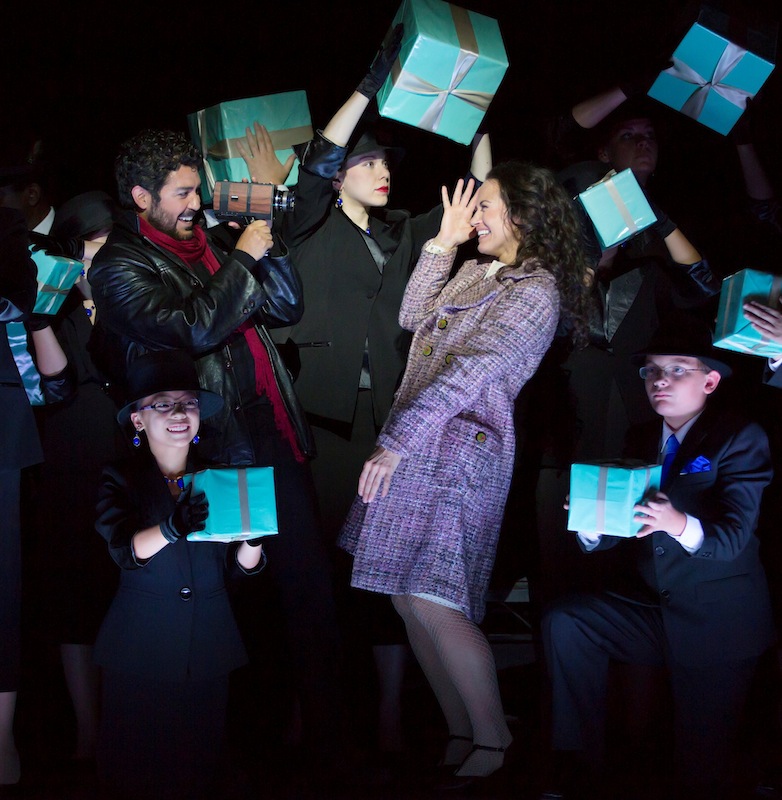BLO’s updated “Bohème” proves more amiable than revolutionary

Jesus Garcia and Kelly Kaduce in Boston Lyric Opera’s production of Puccini’s “La Boheme.” Photo: T. Charles Erickson
It was worth a try: set the flaming youth of La Bohème amid the 1968 student uprisings in Paris. Turn these likable characters’ impoverished state into a critique of heartless capitalism and consumerism.
The Boston Lyric Opera’s production of Puccini’s opera, which opened Friday night at the Shubert Theatre, was festooned with images of Charles de Gaulle, quotations from Albert Camus, allusions to 1960s Paris couturiers and New Wave cinema, and most spectacularly, in place of Act III’s Paris city gate, an enormous Les Miz-esque barricade built of household junk thrown in a towering pile.
It was an impressive evocation of that dramatic time and place, but in the end Puccini (and his librettists Giuseppe Giacosa and Luigi Illica) wouldn’t cooperate. Despite the implied upheavals in the background, their funny-sad, intimate opera remained just that, and its young characters went on writing, reading, painting, philosophizing, falling in love, and getting their hearts broken just as they have since this work premiered in 1896.
A truly revolutionary La Bohème would require a lot more rewriting than was done here, if it could be accomplished at all. But to say that is to take nothing away from John Conklin’s vivid and image-rich décor, effectively lit by D.M. Wood, and Nancy Leary’s believably European-bohemian costumes (no tie-dye or bellbottoms).
The production was blessed with plenty of tenor power in the role of the writer (and in this production, filmmaker) Rodolfo. Jesus Garcia scaled the vocal heights with ease, and fell in love quite charmingly, orbiting Mimì with his movie camera as she introduced herself in the aria “Sì, mi chiamano Mimì.”
As Mimì, soprano Kelly Kaduce didn’t match Garcia vocally in the first act, but later, even as her character’s strength was failing, her own voice seemed to get stronger, and she drew the audience into her desperate situation and sad fate.
Rodolfo’s three roommates—baritone Jonathan Beyer as Marcello, bass-baritone Brandon Cedel as Colline, and baritone Andrew Garland as Schaunard—were convincing in their matey horseplay and vocally up to the job, Cedel in particular standing out for his stage presence and trumpet-like tone. Beyer effectively mined the humor of a tall man flummoxed.
As the flummoxer-in-chief, the café singer Musetta, soprano Emily Birsan drew all eyes to her with a slinky, hair-tossing performance and seductive singing.
Baritone James Maddalena not only was solid vocally, but gave everybody an acting lesson with brief but touching portrayals of two characters, the lustful petit-bourgeois landlord Benoît in Act I and Musetta’s rich, elderly admirer Alcindoro in Act II.
Chorusmaster Michelle Alexander had the BLO Chorus in top shape, as did Kirsten Shetler with her children’s chorus, Voices Boston.
Conductor David Angus and the BLO orchestra effectively evoked all the opera’s moods, from the moonlit romance of Act I to Act II’s brassy street scene to Rodolfo’s anguish at the end.
Rosetta Cucchi’s stage direction included an amusing satirical turn for the chorus as compulsive shoppers in Act II, flourishing Tiffany-blue boxes. Her hyperactive blocking for the guys in the garret, the constant crossing back and forth and business with blankets, became wearying after a while, but one could argue the characters had to do that to keep warm.
In the end, if the ‘60s political message didn’t add much to Puccini’s original, neither did it prevent the talented cast and players from putting across the dramatic punch and irresistible melodies of this evergreen opera.
La Bohème continues with performances 7:30 p.m. Wednesday andFriday and 3 p.m. Sunday. blo.org; 617-542-6772.
Posted in Performances




